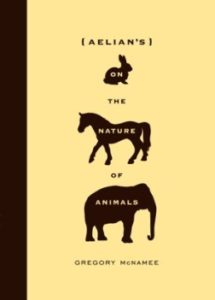A review of Gregory McNamee’s translation of On the Nature of Animals (Trinity University Press, 192 pp., July 2011).
By Peter Bebergal
July saw the publication of Claudius Aelian’s On the Nature of Animals translated by Gregory McNamee. Aelian was a Roman teacher whose proficiency in Greek made him famous. Aeilan (ca. 175 – ca. 235) was also a collector of quotations, legends, and lore of the ancient world, and his On the Nature of Animals originally consisted of 17 volumes. McNamee’s version is a slight, one-volume book, intended for a popular audience. Still, its thoughtful curation teaches important lessons about the intersection between magic, natural history, and morality as well as the evolution of superstition toward what was thought to be a more rational form of theology.
We are governed, it was once thought, by a vast and complex system of correspondences. Plato taught that human beings are a microcosm of the cosmos, both containing a system of spheres that govern the motions and, as it were, emotions. It was also thought that the aspects and personalities of the planets correspond to certain plants and animals. Knowledge of these relationships would inform what is commonly called sympathetic magic where “like produces like.” While magic was mostly forbidden in the Roman world, this did not stop Aelian from essentially drawing up a catalogue of correspondences to be found in the animal kingdom. His sources, such as Pliny the Elder, were themselves experts in magic, despite their warnings against its use. Pliny wrote: “We may rest fully persuaded then, that magic is a thing detestable in itself. Frivolous and lying as it is, it still bears, however, some shadow of truth upon it; though reflected, in reality, by the practices of those who study the arts of secret poisoning, and not the pursuits of magic.” And so we, and likely Aelian, learn from Pliny that wearing a lizard around your neck will cure a fever.
Unlike Pliny though, Aelian doesn’t have to mention magic to convey its lessons. By simply folding the formulas and correspondences into fanciful tales of animals, he can comment on their legends and their habits. And so matter-of-factly, Aelian explains, “If you scatter roses on beetles, you will destroy them.” For readers of his own time, these kinds of charms and recipes may have been familiar, if not sensible. But what those same readers also gained from Aelian was something even more radical than hidden lessons in sympathetic magic. What the animals in Aelian’s lexicon teach is morality.
Aelian prefigures the Medieval Bestiaries that would have at their heart a Christian sensibility. Not only do the wonders of the natural world reflect God’s magisterial handiwork, everything in Creation is a page in God’s (or the gods’) Book – a living Bible as it were – that can teach moral lessons. Any attempt to read it might be considered trying to divine the esoteric secrets of nature, if not for the fact that animals freely display the lessons in their behavior. Take for example the Dolphin whose tenacious devotion for others of its kind far exceeds that of humans who “will barely lift a finger to help a relative, man or woman, in need.”
Observing the habits of animals does not require any special skill, magic or otherwise, so moral lessons become available to everyone. One does not even need to know how to read. And going directly to the gods for moral instruction is too troublesome. Because the gods are so fickle, too just or unkind in their moral lessons, human consciousness cannot gain much good from them. Aelian’s animals mediate the gods in a way that is identifiable. Nature is a more precise temple.
Aelian is a poor taxonomist, but unabashedly so. His interest is not in dividing and sorting in order to understand some greater web of interconnectedness. His catalogue is one of both wonder and pragmatism. Aelian prefigures Stephen Jay Gould who referred to religion and science as “non-overlapping magisteria.” There is no inherent conflict between the two because they engage entirely different realms of knowledge, one empirical and the other concerned with ultimate meaning. Aelian continually admits that his methods are not always sound, that his sources are fables, legends, and anecdotes, and only rarely his own observation. But his intent is no less divine as a result: “The gods know which animal is the gentelest and which is the fiercest, and so should we.”
This realization, that the natural world is a direct and more efficacious source of knowledge, would be the beginning of science. And eventually magic and morality would be stripped completely from our considerations of nature, leaving only the classifications. But it’s in the realm of religion where Aelian’s legacy can be seen most clearly, sadly if only by way of its absence. Fundamentalism in religion has removed the divine from nature by turning it into something merely made by God. The natural world no longer speaks, no longer has secrets to share, does not worship God, and nothing of God can be divined from it. Aelian reminds us of a time when the world was echoing with divine voices, when animals reminded us about the best and worst of ourselves, and before awe and wonder at the natural world were replaced by a belief that this earth is merely where we happen to dwell while waiting for the messiah.
Peter Bebergal is author of Too Much to Dream: A Psychedelic American Boyhood, a memoir/cultural history of drugs and mysticism (Soft Skull Press, 2011) and co-author, with Scott Korb, of The Faith Between Us (Bloomsbury, 2007). He blogs at mysterytheater.blogspot.com.
Catch Peter reading from Too Much to Dream as part of The Fall 2011 Revealer Reading Series at the NYU Bookstore on October 12th!

